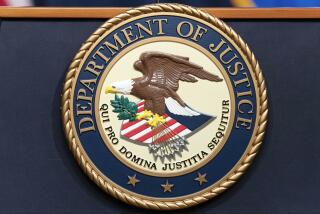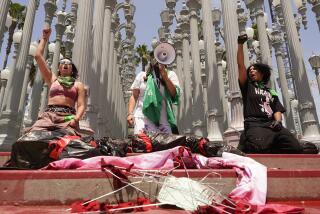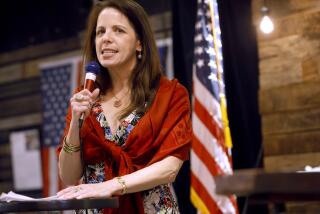AIDS Activists Plead No Contest to Misdemeanors
- Share via
Two AIDS activists in San Francisco pleaded no contest this week to misdemeanor counts of making threatening or annoying phone calls to public health officials and newspaper reporters in late 2001.
Visiting Superior Court Judge Raymond Arata sentenced Michael Petrelis and David Pasquarelli to three years’ probation as well as mandatory mental health counseling. Restraining orders remain in place that bar the pair from contacting or going near the alleged victims.
Petrelis and Pasquarelli, both of whom have AIDS, were arrested in November 2001 on dozens of felony and misdemeanor charges and spent 72 days in jail before being released on bail. Among other things, they said they were protesting AIDS and syphilis prevention campaigns that they believe stigmatized gay sex and accused a top public health official of wanting to quarantine gay men.
Petrelis pleaded no contest to two misdemeanors; Pasquarelli to three.
Petrelis said he agreed to the pleas because his health deteriorated -- he developed skin infections and pneumonia -- in jail and as he prepared his defense. He now concedes that it was “inappropriate” to make the phone calls in the middle of the night.
“I like living a lot,” Petrelis said in an interview. “I want to keep myself healthy and alive, and going through a [preliminary hearing] or eventual trial, I think, could have been deadly.”
Pasquarelli said he too had suffered serious illnesses since his arrest and felt it was time to end the legal proceedings.
“The sad part,” he said, “is that they really put us through the wringer for two years, in and out of the hospital, in and out of court. I thought it was really cruel, and I had enough.”
Assistant Dist. Atty. Michon Martin said prosecutors decided to settle the case because the defendants agreed to abide by the restraining orders and accept some responsibility for their actions. Also, she said, Pasquarelli’s declining health played a role.
“As a human being, I’m thinking we need to resolve this for everybody,” Martin said. “Even if we went to trial, this is not the type of case that we would send them to state prison on.”
Some of those on the receiving end of the phone calls said they were unaware of the plea deal and uncertain what to make of it.
“Violence and threats of violence are not activism,” said Jeff Sheehy, a press officer for UC San Francisco’s AIDS Research Institute, who was among those getting the unwanted calls. “Their goal was not to add to the debate about HIV and AIDS but to shut down the debate.”
Dr. Jeffrey Klausner, director of sexually transmitted disease control in San Francisco, said he was “cautious” about the deal. Because of the annoying calls, Klausner changed his home and work telephone numbers, his e-mail address and fax numbers.
“I’m not entirely convinced that the plea bargain and the stay-away orders are going to adequately protect myself and my family,” he said. “We’ll have to see.”
The wave of phone calls began after San Francisco launched a syphilis awareness campaign in October 2001, citing a significant increase in the number of cases among gay and bisexual men. The two protesters said they believed those statistics were concocted to collect more federal money for the city.
After they were arrested, at least 200 activists across the country rallied around their cause, saying the charges were inflated and were intended to squelch dissent.
Pasquarelli was an active member of ACT UP San Francisco, a breakaway group not affiliated with the national ACT UP. He and the San Francisco group say AIDS is caused by the side effects of HIV treatment rather than the human immunodeficiency virus itself.
Petrelis, who is not a member of ACT UP San Francisco, disagrees with those views but shares the group’s belief that federal AIDS funds are being misspent on unnecessarily frightening and sexually graphic prevention messages.
This week Petrelis said he intends to remain active as a watchdog of AIDS prevention groups. The plea deal allows him to write a one-page letter to the San Francisco Chronicle every day and attend meetings of the Board of Supervisors. “My political convictions are important and dear to me,” he said.
More to Read
Sign up for Essential California
The most important California stories and recommendations in your inbox every morning.
You may occasionally receive promotional content from the Los Angeles Times.










